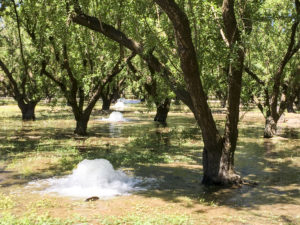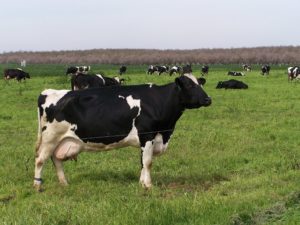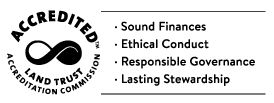Flood Irrigation – Friend or Foe?
In our most recent almond video, farmer John Ferrari shares irrigation practices, including flood irrigation. Simply put, flood irrigation is the practice of flooding land with amazing amounts of water to grow crops. Although it may seem inefficient and even wasteful at first glance, flood irrigation is more environmentally friendly than it appears. In actuality, there are significant environmental benefits gained from the perceived inefficiencies of flood irrigation. Not everything is as it appears!
Farmers are flexible with the methods they use to water crops. There are many factors to take into consideration when growing crops, including sustaining productive land and conserving our water resources… or more accurately, replenishing our water resources.

Holstein cow at Magneson’s dairy, which uses flood irrigation as part of its water management program.
“Farmland can be, and has been largely so in the past, recharge land,” said Vance Kennedy, a hydrologist who retired from the Department of the Interior. “If we can protect the farmland we have, we can keep our options for the best means of protecting our future water supply open, but still save water in the meantime. But farmers must continue to flood irrigate to replace pumped ground water.” “The inefficiency of flood irrigation carries benefits for recharge,” said Scott Magneson, an organic dairyman and farmer. “Management of your flood irrigation practices is key. We keep a close eye on nutrient run-off and we work with experts to make sure we are doing the right things.”
Ground water replenishment is the most obvious, but not the solitary benefit of flood irrigation. Flood irrigation flushes soils of dissolved salts that plants do not absorb. If not removed, high soil salinity can be detrimental to plant growth and yield as well as their ability to absorb moisture. “Considering canal water or river water is essentially snowmelt, if we moved cities to a more strictly surface water use system, flood irrigation will flush soils of accumulated salts via clean snowmelt water and also recharge ground water stores with the same fresh water,” said Kennedy.
In our video, we asked farmer John his perspective on flood irrigation. “Flood irrigation is important to us because of our peach production…the best production comes from flood irrigation.” Although the best production comes from flood irrigation, most of farmer John’s crops are not flood irrigated. “What prevents him from using more? The cost of the water… growers aren’t going to do that unless it’s necessary.”
Keeping in mind that our population continues to grow and farmers must continue to produce more food on less land, consider this farm water fact (from farmwater.org) next time you think of flood irrigation as foe: “California farmers have invested more than $3 billion in cutting edge technology to make California farms more water-efficient & more productive overall. And, while total agricultural water use in California has remained relatively stable over the last 50 years, the amount of food we produce with that water has increased over 43 percent.” Check out the California Farm Water Coalition’s website, www.farmwater.org, for more information!


